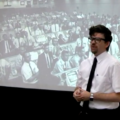When we lived in Bangkok during my childhood, my mother taught English as a second language at a language school for adults. One year, the teachers staged a Christmas play. I suppose that they did this partly to celebrate the holiday and give the students exposure to Western holiday traditions, but also because the students didn’t have many opportunities to hear English spoken. (This was well before videotapes. There was only one TV channel in Thailand at the time, which only ran a few hours of programming per week in English, and not many English-language movies were shown at Thai cinemas.)
The play, called “Santa and the Efficiency Expert,” was probably from a book of material considered suitable for children. The story takes place at Santa’s workshop at the North Pole, when someone decides that Santa’s operation is too old-fashioned, and brings in a ruthless efficiency expert to modernize it. The efficiency expert is accompanied by his wife (played by my mother), an even less sympathetic character.
I don’t recall the details – Santa’s elves get replaced by an assembly line? – but the changes are soon found to be contrary to the “spirit of Christmas.” By the end of the play, Santa’s workshop is restored to its previous, old-fashioned ways, with the “heart-warming” lesson that kindness and Christmas spirit are far more important than efficiency.
I was outraged.
I understood what the play was trying to get at (the message was delivered with the grace of a lead balloon – I hate writers who talk down to children), but, even at age seven or eight, I vehemently did not agree that efficiency, in itself, was a bad thing.
If a task needs to be done, especially a boring one, why not do it in the most efficient way possible? Why waste time, energy, and brainpower on the dull stuff? By third grade, I was already applying this principle to my schoolwork, a great deal of which I found dull. There is no particular dignity in doing things the “traditional” way if you can achieve results as good or better, with less effort and less boredom.
I never forgot this reverse lesson, and I’ve never stopped looking for efficiencies in everything I do. Plenty of boring work has come my way – every job has its dull moments (and hours, and days), especially junior-level jobs. For me, finding the most time-saving way to do a boring task (without skimping on quality), or at least finding a way to learn from it, became a game in itself. Just getting the job done or filling in the hours was never enough: I was always driven to somehow improve the overall process or situation.
Weird jobs I have had
At the start of my working life, when I was temping in and around Washington, DC, I had some amazingly dull jobs. At one, I was hired at a high hourly rate based on my typing skills, and was asked repeatedly, before being granted this particular job, if I had a college degree (I did). When I arrived at the site, I learned that the task was to alphabetize thousands of (paper) employee files. I asked the hirer if he realized he was paying top dollar for typing skills in a job that needed no typing. “I know,” he said, tight-lipped. “But this job has been done badly several times already.”
So I did it. It took me all week, with manila folders spread over every surface of an empty office. I don’t recall finding any particular efficiencies in that job, but I got it done, and done well – the hirer was happy. There were some edge case names that actually required thinking about; perhaps the unconscious lesson I took from that job was an appreciation for the non-straightforwardness of sorting problems.
Other secretarial jobs I had during my college and post-college years included tasks like stuffing, addressing, and stamping envelopes, sometimes thousands at a time for monthly mailings (yes, there were machines that did some of this, but not every office had them).
Sometimes the challenges were unusual. When I worked in the commercial section of the US embassy in Jakarta, I learned that some Javanese names are so long that they wouldn’t fit in the width of a standard address label. But it would be rude to truncate or abbreviate them. Changing the type size was not possible: state of the art then for office printing was daisy-wheel print heads, monospaced at fixed point sizes. But I managed it, 3000 address labels per monthly mailing, and then I also had to do all the folding and stuffing and labeling. I developed a keen eye for all the tiny places where space could be saved in lines of type – this later stood me in good stead when laying out pages, chapters, and books.
Further on in my career, I applied my mania for efficiency to customer service. I moved my tech writing from printed manuals to the brand-new World Wide Web because that was the fastest way to get information out to customers and keep it up to date. I had files of boilerplate that I could cut and paste into email or the Usenet in response to repetitive customer queries, but once I had access to a website, my rule of thumb became: when you have to say the same thing three times or more, it’s time to put it on a web page.
Process efficiency
I’m not a fan of process for its own sake – a trap that many organizations fall into. Some process may be needed in any complex situation, but all processes should be necessary, easy, intuitive, efficient, and respectful of the time and energy of the people who must use them. Over the years, I have developed a knack for analyzing the processes I find myself dealing with, root-causing their inefficiencies and other pain points, and coming up with suggestions for improvement.
Most recently, at AWS, I co-administered a blog which, when I took it over, suffered a problem common to most AWS blogs: authors’ desire to publish outpaced the number of posts we could get through the pipeline, resulting in an ever-growing backlog and great frustration for authors. I gathered metrics to figure out where the bottlenecks were, lobbied for resources to help deal with those, and kept iterating until I had smoothed the way as much as possible with the resources I was able to obtain. The situation is still far from perfect, but it’s better than it was, and I documented everything and trained others so that the process did not depend on me being around to manage it.
I’m good at this kind of thing and enjoy it. But I have never had the scope to fix everything I can see that needs fixing – sometimes it’s hard even to make others see the problems. (“It is difficult to get a man to understand something when his salary depends upon his not understanding it.”) Several times in my career I have tried hard, for years, to make things great for customers and colleagues in a given situation, and eventually burned out in frustration when I could not do so. In the end, the only solution has been to quit those jobs and go find other problems to solve.




